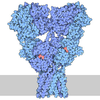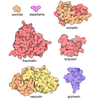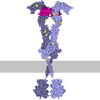+ Open data
Open data
- Basic information
Basic information
| Entry | Database: PDB / ID: 5fxk | ||||||
|---|---|---|---|---|---|---|---|
| Title | GluN1b-GluN2B NMDA receptor structure-Class Y | ||||||
 Components Components |
| ||||||
 Keywords Keywords | TRANSPORT PROTEIN / SIGNALING PROTEIN / NMDA RECEPTOR / GLUTAMATE RECEPTOR / GLUN1 / GLUN2B / ION CHANNEL | ||||||
| Function / homology |  Function and homology information Function and homology informationcellular response to curcumin / cellular response to corticosterone stimulus / cellular response to magnesium starvation / sensory organ development / positive regulation of Schwann cell migration / pons maturation / regulation of cell communication / sensitization / EPHB-mediated forward signaling / Assembly and cell surface presentation of NMDA receptors ...cellular response to curcumin / cellular response to corticosterone stimulus / cellular response to magnesium starvation / sensory organ development / positive regulation of Schwann cell migration / pons maturation / regulation of cell communication / sensitization / EPHB-mediated forward signaling / Assembly and cell surface presentation of NMDA receptors / response to hydrogen sulfide / auditory behavior / olfactory learning / conditioned taste aversion / dendritic branch / regulation of respiratory gaseous exchange / response to other organism / apical dendrite / regulation of ARF protein signal transduction / fear response / protein localization to postsynaptic membrane / transmitter-gated monoatomic ion channel activity / positive regulation of inhibitory postsynaptic potential / response to methylmercury / suckling behavior / response to manganese ion / response to glycine / interleukin-1 receptor binding / response to carbohydrate / propylene metabolic process / cellular response to dsRNA / cellular response to lipid / response to growth hormone / heterocyclic compound binding / negative regulation of dendritic spine maintenance / positive regulation of glutamate secretion / RAF/MAP kinase cascade / regulation of monoatomic cation transmembrane transport / NMDA glutamate receptor activity / Synaptic adhesion-like molecules / voltage-gated monoatomic cation channel activity / response to glycoside / NMDA selective glutamate receptor complex / glutamate binding / ligand-gated sodium channel activity / neurotransmitter receptor complex / response to morphine / regulation of axonogenesis / neuromuscular process / calcium ion transmembrane import into cytosol / regulation of dendrite morphogenesis / protein heterotetramerization / male mating behavior / regulation of synapse assembly / response to amine / regulation of cAMP/PKA signal transduction / glycine binding / receptor clustering / small molecule binding / startle response / parallel fiber to Purkinje cell synapse / positive regulation of reactive oxygen species biosynthetic process / monoatomic cation transmembrane transport / behavioral response to pain / regulation of MAPK cascade / positive regulation of calcium ion transport into cytosol / cellular response to glycine / extracellularly glutamate-gated ion channel activity / regulation of postsynaptic membrane potential / response to magnesium ion / action potential / associative learning / response to electrical stimulus / excitatory synapse / positive regulation of dendritic spine maintenance / monoatomic ion channel complex / social behavior / monoatomic cation transport / regulation of neuronal synaptic plasticity / glutamate receptor binding / Unblocking of NMDA receptors, glutamate binding and activation / positive regulation of excitatory postsynaptic potential / long-term memory / detection of mechanical stimulus involved in sensory perception of pain / response to mechanical stimulus / neuron development / synaptic cleft / phosphatase binding / prepulse inhibition / positive regulation of synaptic transmission, glutamatergic / behavioral fear response / multicellular organismal response to stress / postsynaptic density, intracellular component / monoatomic cation channel activity / response to fungicide / calcium ion homeostasis / glutamate-gated receptor activity / regulation of long-term synaptic depression / regulation of neuron apoptotic process / cell adhesion molecule binding Similarity search - Function | ||||||
| Biological species |  | ||||||
| Method | ELECTRON MICROSCOPY / single particle reconstruction / cryo EM / Resolution: 6.4 Å | ||||||
 Authors Authors | Tajima, N. / Karakas, E. / Grant, T. / Simorowski, N. / Diaz-Avalos, R. / Grigorieff, N. / Furukawa, H. | ||||||
 Citation Citation |  Journal: Nature / Year: 2016 Journal: Nature / Year: 2016Title: Activation of NMDA receptors and the mechanism of inhibition by ifenprodil. Authors: Nami Tajima / Erkan Karakas / Timothy Grant / Noriko Simorowski / Ruben Diaz-Avalos / Nikolaus Grigorieff / Hiro Furukawa /  Abstract: The physiology of N-methyl-d-aspartate (NMDA) receptors is fundamental to brain development and function. NMDA receptors are ionotropic glutamate receptors that function as heterotetramers composed ...The physiology of N-methyl-d-aspartate (NMDA) receptors is fundamental to brain development and function. NMDA receptors are ionotropic glutamate receptors that function as heterotetramers composed mainly of GluN1 and GluN2 subunits. Activation of NMDA receptors requires binding of neurotransmitter agonists to a ligand-binding domain (LBD) and structural rearrangement of an amino-terminal domain (ATD). Recent crystal structures of GluN1-GluN2B NMDA receptors bound to agonists and an allosteric inhibitor, ifenprodil, represent the allosterically inhibited state. However, how the ATD and LBD move to activate the NMDA receptor ion channel remains unclear. Here we applied X-ray crystallography, single-particle electron cryomicroscopy and electrophysiology to rat NMDA receptors to show that, in the absence of ifenprodil, the bi-lobed structure of GluN2 ATD adopts an open conformation accompanied by rearrangement of the GluN1-GluN2 ATD heterodimeric interface, altering subunit orientation in the ATD and LBD and forming an active receptor conformation that gates the ion channel. | ||||||
| History |
|
- Structure visualization
Structure visualization
| Movie |
 Movie viewer Movie viewer |
|---|---|
| Structure viewer | Molecule:  Molmil Molmil Jmol/JSmol Jmol/JSmol |
- Downloads & links
Downloads & links
- Download
Download
| PDBx/mmCIF format |  5fxk.cif.gz 5fxk.cif.gz | 432.1 KB | Display |  PDBx/mmCIF format PDBx/mmCIF format |
|---|---|---|---|---|
| PDB format |  pdb5fxk.ent.gz pdb5fxk.ent.gz | 279.5 KB | Display |  PDB format PDB format |
| PDBx/mmJSON format |  5fxk.json.gz 5fxk.json.gz | Tree view |  PDBx/mmJSON format PDBx/mmJSON format | |
| Others |  Other downloads Other downloads |
-Validation report
| Summary document |  5fxk_validation.pdf.gz 5fxk_validation.pdf.gz | 768 KB | Display |  wwPDB validaton report wwPDB validaton report |
|---|---|---|---|---|
| Full document |  5fxk_full_validation.pdf.gz 5fxk_full_validation.pdf.gz | 801.8 KB | Display | |
| Data in XML |  5fxk_validation.xml.gz 5fxk_validation.xml.gz | 69.5 KB | Display | |
| Data in CIF |  5fxk_validation.cif.gz 5fxk_validation.cif.gz | 112.2 KB | Display | |
| Arichive directory |  https://data.pdbj.org/pub/pdb/validation_reports/fx/5fxk https://data.pdbj.org/pub/pdb/validation_reports/fx/5fxk ftp://data.pdbj.org/pub/pdb/validation_reports/fx/5fxk ftp://data.pdbj.org/pub/pdb/validation_reports/fx/5fxk | HTTPS FTP |
-Related structure data
| Related structure data |  3356MC  3352C  3353C  3354C  3355C 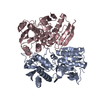 5b3jC  5fxgC  5fxhC  5fxiC  5fxjC C: citing same article ( M: map data used to model this data |
|---|---|
| Similar structure data |
- Links
Links
- Assembly
Assembly
| Deposited unit | 
|
|---|---|
| 1 |
|
- Components
Components
| #1: Protein | Mass: 95220.727 Da / Num. of mol.: 2 / Fragment: UNP RESIDUES 23-868 / Mutation: YES Source method: isolated from a genetically manipulated source Source: (gene. exp.)   #2: Protein | Mass: 92931.078 Da / Num. of mol.: 2 / Fragment: UNP RESIDUES 27-852 / Mutation: YES Source method: isolated from a genetically manipulated source Source: (gene. exp.)   |
|---|
-Experimental details
-Experiment
| Experiment | Method: ELECTRON MICROSCOPY |
|---|---|
| EM experiment | Aggregation state: PARTICLE / 3D reconstruction method: single particle reconstruction |
- Sample preparation
Sample preparation
| Component | Name: NMDA RECEPTOR / Type: COMPLEX |
|---|---|
| Buffer solution | Name: 200 MM NACL, 20 MM HEPES PH 7.0, 10 MM GLYCINE, 10 MM L-GLUTAMATE, 0.002 % MNG-3 pH: 7 Details: 200 MM NACL, 20 MM HEPES PH 7.0, 10 MM GLYCINE, 10 MM L-GLUTAMATE, 0.002 % MNG-3 |
| Specimen | Conc.: 2 mg/ml / Embedding applied: NO / Shadowing applied: NO / Staining applied: NO / Vitrification applied: YES |
| Specimen support | Details: HOLEY CARBON |
| Vitrification | Instrument: FEI VITROBOT MARK II / Cryogen name: ETHANE / Details: ETHANE |
- Electron microscopy imaging
Electron microscopy imaging
| Experimental equipment |  Model: Titan Krios / Image courtesy: FEI Company |
|---|---|
| Microscopy | Model: FEI TITAN KRIOS / Date: Aug 10, 2015 |
| Electron gun | Electron source:  FIELD EMISSION GUN / Accelerating voltage: 300 kV / Illumination mode: FLOOD BEAM FIELD EMISSION GUN / Accelerating voltage: 300 kV / Illumination mode: FLOOD BEAM |
| Electron lens | Mode: BRIGHT FIELD / Nominal magnification: 22500 X / Nominal defocus max: 2500 nm / Nominal defocus min: 1000 nm |
| Image recording | Electron dose: 100 e/Å2 / Film or detector model: GATAN K2 SUMMIT (4k x 4k) |
- Processing
Processing
| EM software |
| ||||||||||||||||||||
|---|---|---|---|---|---|---|---|---|---|---|---|---|---|---|---|---|---|---|---|---|---|
| Symmetry | Point symmetry: C2 (2 fold cyclic) | ||||||||||||||||||||
| 3D reconstruction | Resolution: 6.4 Å / Num. of particles: 15000 Details: SIDE CHAINS WERE NOT INCLUDED IN THE MODEL SUBMISSION BASED ON EXPERIMENTAL DATA FROM EMDB EMD-3356. (DEPOSITION ID: 14328). Symmetry type: POINT | ||||||||||||||||||||
| Atomic model building | Protocol: OTHER / Space: REAL / Target criteria: REAL SPACE / Details: METHOD--REAL SPACE | ||||||||||||||||||||
| Refinement | Highest resolution: 6.4 Å | ||||||||||||||||||||
| Refinement step | Cycle: LAST / Highest resolution: 6.4 Å
|
 Movie
Movie Controller
Controller



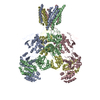

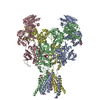
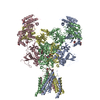


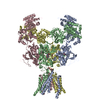
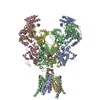
 PDBj
PDBj